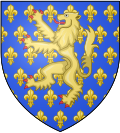Andrew Wyntoun, known as Andrew of Wyntoun (c. 1350 – c. 1425), was a Scottish poet, a canon and prior of Loch Leven on St Serf's Inch and, later, a canon...
4 KB (420 words) - 04:39, 14 July 2023
towards legend by the end of the 14th century, when John of Fordun and Andrew of Wyntoun wrote their histories. Hector Boece, Walter Bower, and George Buchanan...
28 KB (3,401 words) - 09:20, 29 October 2024
aspect of his character in his reprisals in the Province of Moray. Andrew of Wyntoun's Orygynale Cronykil of Scotland says that Alexander was holding court...
11 KB (1,280 words) - 16:18, 7 August 2024
closely upon them, even in the significant works of John of Fordun, Andrew Wyntoun and Walter Bower. For example, Bower includes in his text the eulogy...
82 KB (10,801 words) - 15:15, 31 October 2024
certainly had access to Barbour's account were the Scottish historians Andrew Wyntoun and Walter Bower. Although neither of these men ever made note of a...
130 KB (15,026 words) - 16:28, 2 November 2024
Gallovidians. Both this source and the Orygynale Cronykil of Scotland by Andrew Wyntoun, reveal that Alexander's troops mounted a second and successful assault...
132 KB (15,421 words) - 12:42, 24 September 2024
Scotland. Henry Beaumont was able to return to Buchan where, according to Andrew Wyntoun, he repaired the old Comyn stronghold of Dundarg on the Aberdeenshire...
24 KB (3,715 words) - 16:24, 17 May 2024
poet is listed again and the conflict is noted: 1350: Andrew of Wyntoun, also known as Andrew Wyntoun (died 1423), Scottish poet, a canon and prior 1352:...
4 KB (347 words) - 19:59, 27 June 2024
years under special instructions from King Edward. The Scottish poet Andrew Wyntoun noted the battle in his verse: That ikle tyme at Lowchmabne Off Annandyrdale...
5 KB (392 words) - 14:04, 24 January 2024
MacDougall, Ewen is also noted by the fifteenth-century chronicler Andrew Wyntoun (died c. 1422). According to later tradition, John MacDougall had two...
57 KB (6,691 words) - 22:38, 24 September 2024



